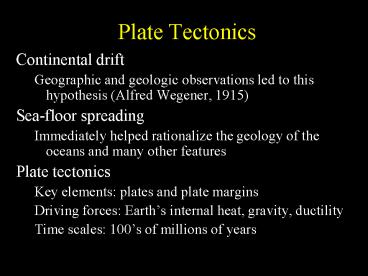Plate Tectonics
1 / 69
Title:
Plate Tectonics
Description:
... of continents Broader Implications Divergent zones Rifted continental margins The development of sedimentary basins Ophiolite sequences Geologic record of ancient ... –
Number of Views:161
Avg rating:3.0/5.0
Title: Plate Tectonics
1
Plate Tectonics
- Continental drift
- Geographic and geologic observations led to this
hypothesis (Alfred Wegener, 1915) - Sea-floor spreading
- Immediately helped rationalize the geology of the
oceans and many other features - Plate tectonics
- Key elements plates and plate margins
- Driving forces Earths internal heat, gravity,
ductility - Time scales 100s of millions of years
2
Continental Drift
- Historic development of ideas based on geologic
observations lacked mechanism - Evidence
- Jigsaw-puzzle fit of continents
- Trends of rock types and structures
- Terrestrial fossils (e.g., Mesosaurus)
- Glacial deposits and other ancient climate
indicators (e.g., late Paleozoic glacial deposits
currently near equator) - 5. Coral reefs
3
Jigsaw-puzzle fit of continents
- Similar geologic features on both sides
4
MesosaurusPermian reptile
- Fossils of non-swimming reptile present in South
America and Africa
5
Sea-floor spreading
- Mid-ocean ridges long recognized, but magnetic
structure only known since WWII (anti-submarine
technology) - Symmetric distribution of magnetic stripes and
age of ocean crust was the key clue - Demonstrated youth of ocean basins and continual
formation of crust - Mechanisms related to mantle convection
6
- Fig. Story 2.11
7
(No Transcript)
8
Topography and symmetry of the ocean floor
9
(No Transcript)
10
Direct measurement of relative plate motions
11
(No Transcript)
12
Plate Tectonics
- The unifying theory of global geology
- Fits many observations
- Geologic (e.g., continental drift)
- Symmetric age of sea-floor around ridges
- Global distribution of earthquakes
- Global distribution of volcanism and intrusion
13
Global distribution of earthquakes
14
Global distribution of volcanism
15
Evidence of subduction
(1) Benioff zone with increasing earthquake
depth (2) high velocity seismic zone parallel to
Benioff zone, due to cold descending slab (3)
sometimes no sediment in trench! (4)
tomography-Farallon Plate detectable under the
western US. (5) arc-type volcanism (6) ocean
crust older than 200 Ma has disappeared - had to
go somewhere
16
Plate Margins
- Divergent
- Rifts to ocean basins
- Convergent
- Oceanic arcs
- Continental arcs
- Continent-continent collision
- Transform
17
Convergent margins
18
ocean-ocean, or ocean-continent collision
examples topographic features stress seismic
ity volcanic activity significance
19
(No Transcript)
20
(No Transcript)
21
continent-continent collision
examples topographic features stress seismic
ity volcanic activity significance
22
(No Transcript)
23
Growth of continents
24
Broader Implications
- oceanic crust young, turning over quickly
- continental crust, older, gradually accreting in
the form of microcontinents and continents.
25
Divergent zones
examples topographic features stress seismic
ity volcanic activity significance
26
Rifted continental margins
- The development of sedimentary basins
Fig. 20.20e
27
(No Transcript)
28
(No Transcript)
29
Ophiolite sequences
- Geologic record of ancient spreading centers
30
transform zones
examples topographic features stress seismic
ity volcanic activity significance
31
Why do oceanic plates move ?
Ridge push spreading ridges stand much higher
than older, colder ocean crust. So plates
slide away from ridges. Also, lithosphere
thickens away from ridges as mantle asthenosphere
cools, forming a another slope along which the
whole lithosphere slides. Slab pull descending
slabs are cold and therefore dense. They become
denser as they descend, lose water, and compact.
They pull lithosphere into the mantle like an
anchor pulls a rope.
32
Transform boundariesoceanic plates
33
Transform boundaries
- Continent-ocean and continent-continent
boundaries
34
Hot spots
- Plumes of deep mantle material rising from the
core-mantle boundary - Cause intense volcanism (Hawaii, Yellowstone)
unrelated to plate boundaries - Hot spots are fixed in space relative to one
another plates move across them (e.g., Pacific
plate). Or are they?
35
(No Transcript)
36
(No Transcript)
37
Divergent margins
38
(No Transcript)
39
(No Transcript)
40
(No Transcript)
41
(No Transcript)
42
(No Transcript)
43
(No Transcript)
44
(No Transcript)
45
(No Transcript)
46
(No Transcript)
47
(No Transcript)
48
(No Transcript)
49
(No Transcript)
50
(No Transcript)
51
(No Transcript)
52
(No Transcript)
53
(No Transcript)
54
(No Transcript)
55
(No Transcript)
56
(No Transcript)
57
(No Transcript)
58
(No Transcript)
59
(No Transcript)
60
(No Transcript)
61
(No Transcript)
62
(No Transcript)
63
(No Transcript)
64
(No Transcript)
65
(No Transcript)
66
(No Transcript)
67
the next50 m.y.years
68
(No Transcript)
69
(No Transcript)































